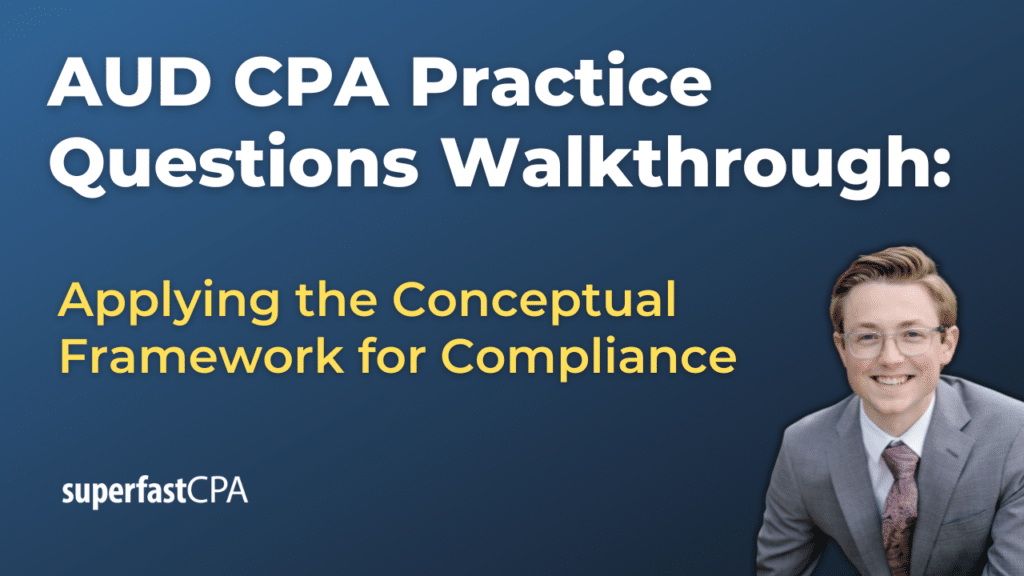In this video, we walk through 5 AUD practice questions about subsequent event disclosures and calculations. These questions are from AUD content area 1 on the AICPA CPA exam blueprints: Ethics, Professional Responsibilities, and General Principles.
The best way to use this video is to pause each time we get to a new question in the video, and then make your own attempt at the question before watching us go through it.
Also be sure to watch one of our free webinars on the 6 “key ingredients” to an extremely effective & efficient CPA study process here…
Applying the Conceptual Framework for Compliance
The AICPA Code of Professional Conduct establishes essential guidelines that CPAs must follow to uphold the profession’s integrity, independence, and ethical standards. This is a detailed overview of five key ethical concepts—Commissions, Returning Client Information, Departing from GAAP, Contingent Fees, and Due Care—with examples to illustrate how these principles apply in practice.
Commissions
CPAs can receive commissions under certain conditions, but there are strict rules about when they are allowed.
- Prohibited Commissions: CPAs cannot accept commissions for services that require independence, such as audits, reviews, or other attest engagements. Independence is essential in these engagements to ensure objective and unbiased reporting.
- Permissible Commissions: CPAs may accept commissions for non-attest services (e.g., consulting or tax services) as long as the arrangement is disclosed to the client.
Example:
- Prohibited: A CPA auditing a client’s financial statements receives a commission for recommending the client use specific accounting software.
- Permissible: A CPA providing consulting services earns a commission for referring a client to a payroll service, with full disclosure to the client.
Returning Client Information
CPAs have an ethical obligation to return client-provided records upon request, regardless of whether the client has unpaid fees.
- Client-Provided Records: These must always be returned promptly.
- CPA-Prepared Work Product: CPAs may withhold this (e.g., tax returns or financial statements) unless required by law or prior agreement, provided their actions are not coercive.
Example:
A client requests their original financial documents after terminating services with the CPA. Even though the client has unpaid fees, the CPA must return the records promptly.
Departing from GAAP
In rare cases, CPAs may depart from generally accepted accounting principles (GAAP) if strict adherence would result in misleading financial statements.
- Criteria for Departure:
- There are unusual circumstances.
- Following GAAP would distort the financial presentation.
- The departure, its justification, and its financial impact are fully disclosed.
Example:
A nonprofit organization incurs extraordinary expenses due to a natural disaster. Reporting these costs as expenses under GAAP would misrepresent the organization’s financial stability. The CPA departs from GAAP, reclassifying the costs with proper disclosure to avoid misleading users.
Contingent Fees
Contingent fees, where payment depends on achieving a specific outcome, are allowed in some situations but prohibited in others.
- Prohibited Contingent Fees: CPAs cannot accept contingent fees for services requiring independence, such as audits, reviews, or attest engagements.
- Permissible Contingent Fees: These are allowed for services such as legal proceedings, amended tax returns, or compilations, provided the lack of independence is disclosed when necessary.
Example:
- Allowed: A CPA agrees to a contingent fee for preparing an amended tax return that seeks a refund, contingent on a favorable court ruling.
- Prohibited: A CPA performing an audit cannot accept a contingent fee for also recommending the client’s products to a third party.
Due Care
Due care requires CPAs to act competently, diligently, and with professional skepticism, ensuring that all work adheres to professional standards.
- Key Elements of Due Care:
- Maintaining professional competence through continuing education.
- Exercising sound judgment and diligence in engagements.
- Supervising and reviewing staff work to ensure quality.
Example:
A CPA documenting all findings and conclusions in detail for an audit opinion demonstrates due care by ensuring the audit complies with professional standards.
Conclusion
The AICPA Code of Professional Conduct provides clear and actionable guidance to help CPAs navigate complex ethical situations. Understanding and applying these principles ensures CPAs maintain public trust and uphold the highest professional standards.













